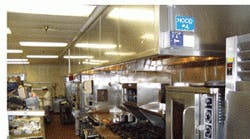Boston Hotel Lowers Energy Consumption With Help of Kitchen Ventilation Controls
Reducing energy consumption and increasing operational efficiency are top priorities for George DiVenuti, director of engineering for Boston Marriott Copley Place hotel. DiVenuti scours the hotel every day, looking for any opportunity—large or small—to reduce, reuse, and recycle.
To save energy during idle cooking times, the hotel installed Intelli-Hood demand-based, variable-speed controls from Melink Corp.
"We have five systems," DiVenuti said. "They are located in the main kitchen, banquet kitchen, Champions (sports bar) kitchen, bake shop, and associate cafeteria."
As soon as it starts turning on cooking equipment, Intelli-Hood goes into action, proportionally increasing and decreasing the speed of exhaust and supply fans based on the heat load of the equipment. As cooking operations reach their peak, optic sensors detect smoke or steam and send the fans back to 100 percent. When the smoke or steam has been exhausted, the fans go back to modulating.
Since installing the controls, DiVenuti has noticed the reported reduction in energy use, and the staff appears more satisfied with a properly balanced kitchen that is quiet during idle cooking times.
"The payback was a little under one year," DiVenuti said. "The local utility company (NSTAR) contributed a rebate towards this project."
As energy costs increase, owners, general managers, directors of engineering, and corporate energy managers are looking at all possible ways to reduce their energy use.
Information and photograph courtesy of Melink Corp.









